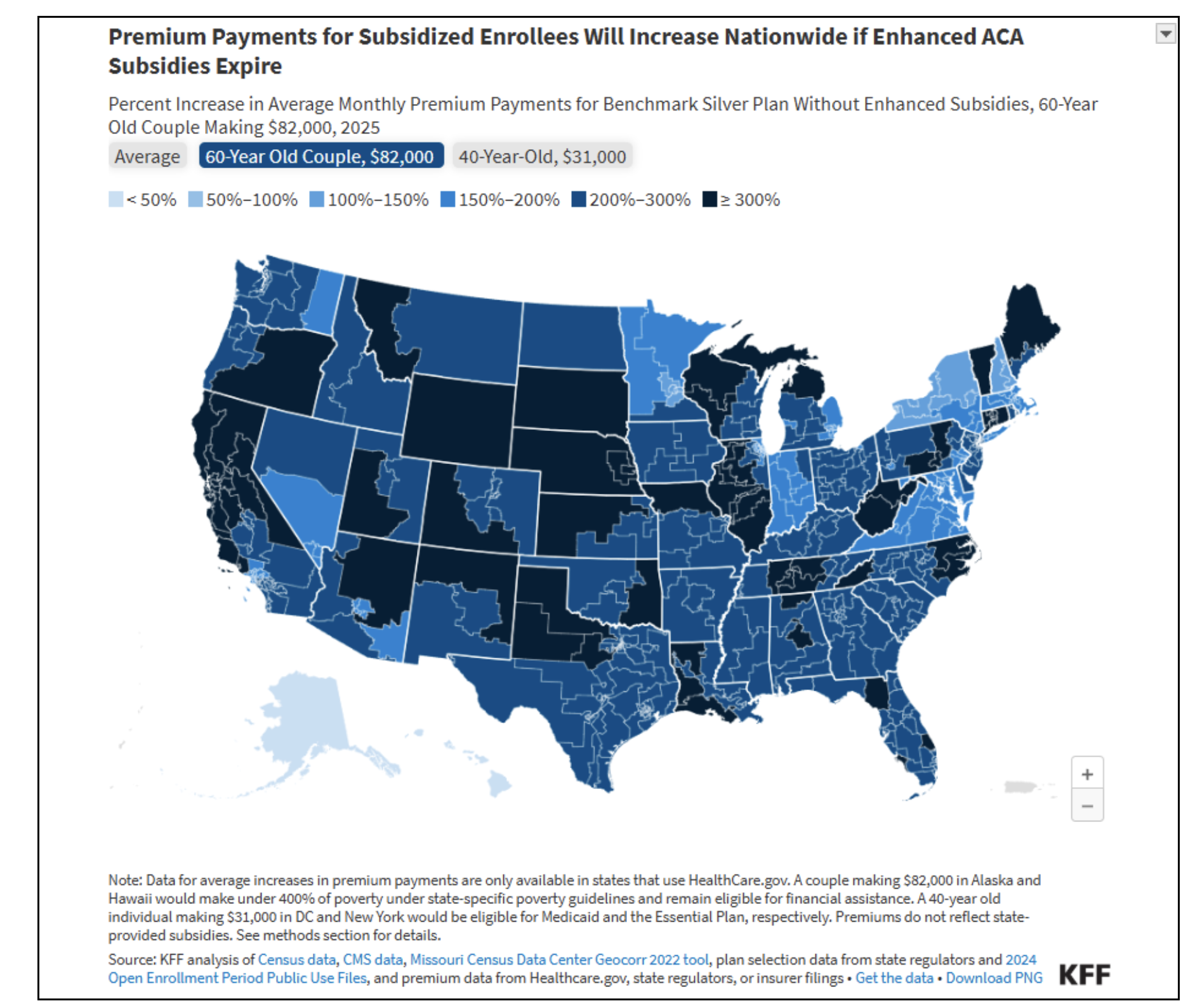In October, most of us enrolled in Obamacare, or Affordable Care Act (ACA), plans on the federal marketplace or on state exchanges will receive our 2026 health plan renewals. And those of us who are getting an enhanced federal subsidy, or eAPTC (enhanced advance premium tax credit), with incomes over 400% of the federal poverty level (FPL), are in for a big shock: Our subsidies will be gone, leaving us to pay the full cost of our health insurance – with premiums jumping as much as 75% or more, in some cases much more.
For a quick background: Before 2022, mid- to higher-income earners paid the full cost of their health insurance, with no federal tax subsidy, but the American Rescue Plan Act (ARPA) was signed into law in 2021, expanding subsidies to millions of mid- to higher-income earners (this was extended in 2022 through the Inflation Reduction Act (IRA)). But this will end on Dec. 31, 2025, without congressional action, forcing people to pay the full, higher premiums.
As of this writing, if you earn more than $62,600 per year ($84,600 for a couple, or $128,600 for a family of four), you will lose your subsidy starting Jan. 1, 2026. For example, a 55-year-old single Milwaukeean today with a health plan costing $298 per month would pay $657.¹ A family of four paying only $518 per month would see a monthly bill of $1,786.¹
And this isn't even taking into account the overall increases in health plan premiums coming next year, estimated to be around 8%.
The bomb is about to drop, and most people don't even know it.
According to a recent poll by the Kaiser Family Foundation (KFF), a health policy research firm, only 7% of us are very aware of the coming subsidy loss, with 21% knowing "some," 33% knowing "a little," and 40% knowing "nothing at all" about it.
The Congressional Budget Office (CBO) estimates that as many as 4.2 million people will lose coverage if the enhanced subsidies aren't extended. Many will either drop their coverage or seek other options.
The impact of the loss of enhanced subsidies will vary by state, with average monthly premiums hitting some people as much as 300% or more.

Most congressional members are aware of the coming surge, and it has been hotly debated in the House and Senate. The recently passed "O3B" (One Big Beautiful Bill), did not include a provision to extend the enhanced subsidies. There have been some legislative proposals to address this issue, in the meantime. Back in January, senators Tammy Baldwin (D-Wis.) and Jeanne Shaheen (D-N.H.) introduced their Health Care Affordability Act to make the enhanced subsidies permanent. Republicans – who are split on extending the enhanced subsidies – and others have explored alternative reforms to the ACA. These alternatives include offering block grants to the states, encouraging health savings accounts (HSAs), and promoting alternative plans (short-term medical plans, hospital indemnity plans, etc.). As of this writing, however, there is currently no bill on the table in Congress.
Some states, aware of the coming shortfall, have explored solutions to mitigate what some see as a coming crisis. These range from tweaking state insurance programs to adding spending initiatives to fill the gap. But the states see the gap as too large for a state to fill sans action from the federal government.
There are some who think that we should scrap the ACA altogether, while others are calling for additional expansion of the ACA and Medicaid. But for millions of middle- to higher-income Americans facing the prospect of highly unaffordable health insurance premiums just a few months away, it isn't theoretical or philosophical or something to be debated and discussed. It's reality. People will face tough decisions of where to cut to make up for their substantially higher health insurance premiums. Some will simply drop their insurance and go without. Others will opt for limited insurance coverage that won't fully protect them.
But for those in Congress who can still do something to protect those who are facing the loss, there is time to act. A word to the wise for our political leaders: In an election year, before you are hit with the tsunami of millions of angry constituents who will demand immediate action, work with your colleagues on your side and across the aisle and find a way to extend the enhanced subsidies that you put in place just a few years ago to help them avoid a catastrophe.






